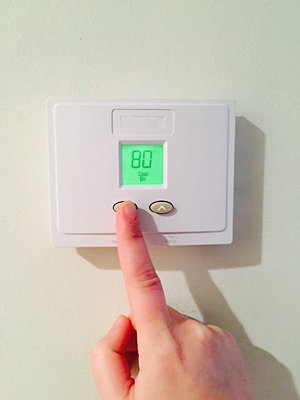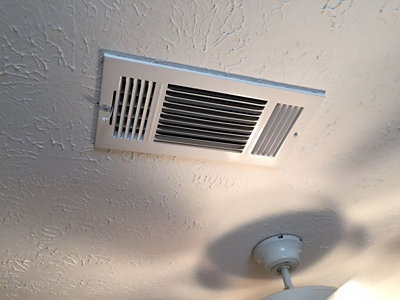How to Prevent High Energy Bills This Summer
April 19, 2017
Summer brings the heat—and you don’t want your monthly energy bills to rise with the temperature.
So, to help you keep more money in the bank for fun summer activities, we have 5 helpful tips on how you can cut your energy costs:
- Mind your thermostat
- Know that fans are your friends
- Learn when to open and close your vents, doors and windows
- Take advantage of “off-peak” energy hours
- Schedule your annual A/C maintenance now
Let’s look at each of these tips in more detail:
Mind your thermostat

Before you head to work, remember to set your thermostat to a warmer temperature.
According to the U.S. Department of Energy, you can save 5%–15% on your cooling bills by simply raising the temperature on your thermostat when you’re away from your home.
So, here’s a good rule of thumb: set your thermostat at 78° while you’re at home, and when you’re away, raise it by 10 degrees.
Worried about coming home to a hot home? Consider investing in a programmable thermostat, which you can program to match your temperature preferences so you’ll always come home to a comfortable temperature.
Some programmable thermostats can even be controlled remotely via the Internet, so if there are changes to your work schedule and you need to come home early, you can set the desired temperature before you arrive home.
Know that fans are your friends
OK let’s be real: 78° is still pretty warm, especially in the summer. But you don’t want to lower the temperature on your thermostat because you’ll increase your energy bills.
That’s where your home’s ceiling and small portable fans save the day. First of all, they’re cheaper to use than your A/C. Here’s how fans vs. air conditioners break down in price:
- A central A/C unit runs about 3 kilowatts and costs about 36 cents per hour to use
- A ceiling fan runs on 30 watts and costs about 1 cent per hour
That breaks down to about $129.60 per month for an air conditioner and $1.20 for a single fan—a 99% difference in cost.
Fans also create a wind chill effect that tricks your body into feeling cooler than the actual room temperature.
In fact, if you use a ceiling fan, you can turn your thermostat up 4° without you noticing a difference in temperature.
So, while using fans by themselves won’t keep your home sufficiently cool, they’ll certainly help reduce energy costs when used to support your central air conditioning system.
Learn when to open and close your vents, doors and windows
Simply opening your vents or closing your blinds could save you money on your monthly energy bill. Let’s look at what you should keep open and when:
Keep these OPEN

A supply vent.
- Your supply vents (always): Some homeowners think closing supply vents in rooms they don’t use saves money. However, this isn’t the case. In fact, it has the opposite effect because it makes your A/C work harder due to increased pressure in the ductwork. More work for your A/C means higher energy costs.
- Room doors (as often as possible): Your A/C system pulls air from your home and then cools it. Similar to supply vents, if you close too many doors in your home, your A/C is working harder to pull air back into the system through the return vents.
- Your windows (at night): When it cools off at night, opening your windows is an easy way to let colder air circulate throughout your home. And it doesn’t cost a thing.
Keep these CLOSED
Your windows, outside doors, blinds and drapes (while the sun is shining): Blinds and drapes keep the heat out of your home, which means your A/C won’t have to work as hard at cooling your home.
And closing your windows and doors keeps the hot outside air out of your home and the cool, conditioned air inside your home. That will save you money on your monthly energy bill.
Take advantage of “off-peak” energy hours
There are certain times of the day and year when energy is more expensive to consume. Summer afternoons (when everyone is using their A/C the most) are more expensive than evenings, when it’s cooler.
To incentivize homeowners to consume electricity at “off-peak” hours, many energy companies (like FPL here in Sarasota), will have lower rates during certain times of the day—usually late at night or early in the morning.
So, if you plan to use appliances that require lots of electrical energy—like a washer, dryer, or dishwasher—consider adjusting your schedule to use them in “off-peak” hours.
Contact your electricity provider for more information on peak hours.
Schedule your A/C maintenance now
Getting a yearly check-up can reduce your monthly energy bill by up to 15% and prevent expensive repairs down the road.
Think of A/C check-ups like car maintenance: If you don’t change your car’s oil every 5,000 miles or maintain important parts regularly, you won’t have good gas milage and your vehicle is more likely to break down prematurely.
It’s the same with air conditioners. Poor maintenance makes your A/C less energy-efficient and more likely to give out before its 15-year lifespan.
During an annual A/C check-up, your technician will check your system’s refrigerant levels, filters, motor, compressor and other essential parts to make sure they’re healthy and running efficiently.
You’ll see the most energy savings when you schedule your annual check-up in the spring, before you put high demand on your A/C during the summer.
Contact Cool Today to schedule your A/C maintenance. We’ve been serving Southwest Florida since 1963.
Posted in: Tips